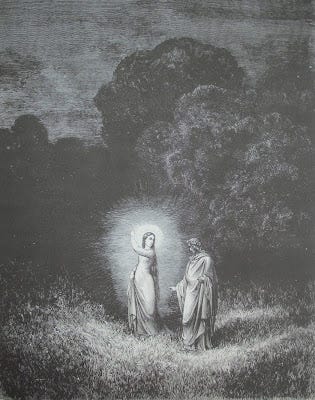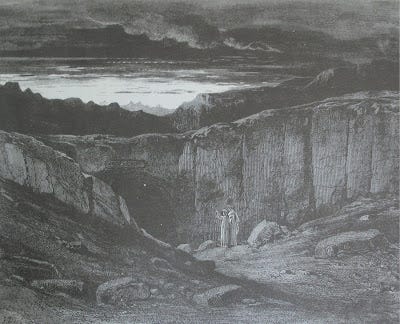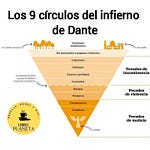Gustavo Doré: La Divina Comedia. Canto II, Beatriz pide a Virgilio que vaya con Dante.
Aquí tenéis los Cantos II y III con un breve comentario.
En cuanto al material usado, he consultado dos libros:
1.- Divina Comedia, Dante Alighieri, de Alianza Editorial. Version poética de Abilio Echeverría, año 2012. ESP.
2.- Divina Commedia, Dante. Edizione Integrali con note e dizionario Dantesco. Introduzioni di Stefano Carrai, Giuseppe Conti e Fabio Pusterla. Editorial Giunti-Barbèra. Año 2022. IT.
Gustavo Doré: Ilustraciones de la Divina Comedia. Dante y Virgilio ante las Puertas del Infierno.
Os dejo también aquí los comentarios realizados por
respecto de estos dos Cantos. Comenzamos por el Canto I, que titula “Cómo superar la duda sobre sí mismo”: “Virgil acknowledges his doubts, but gently corrects him and points out that cowardice is “distracting him from honourable trials” (II.47), the furnace through which all of us must pass to attain growth and transformation. Virgil will help to deliver him from this fear, and here begins an extended speech explaining how he came to be there to help Dante as his guide”.Sobre este Canto, es especialmente interesante este comentario sobre la influencia en Dante de su experiencia militar, especialmente la batalla de Campaldino, a la que me referí en el primera parte del podcast de hoy, cuando hablé sobre su vida. Es posible que muchas de las imágenes dantescas (ojo al significado de esta palabra) que nos ofrece, estén basadas en hechos que vio o que pudo percibir en el campo de batalla.
En cuanto al Canto II, lo titula “las puertas del Infierno son anchas, el camino al Cielo estrecho” y se refiere precisamente al don del entendimiento como vemos en el podcast: “This idea comes directly from St. Thomas Aquinas1 who says “Now as truth is the good of the intellect, so falsehood is its evil.” He is adapting an idea from Aristotle’s Nichomachian Ethics vi.2. Intellect here is not about being smart or clever, but to be one who is guided by reason, or to have - in the Stoic sense of animus - right mindset”.
Gustavo Doré: Ilustraciones de la Divina Comedia. Caronte.
Con esto, termino el podcast de hoy y me despido hasta el domingo que viene en el que veremos el Canto IV (el Primer Círculo del Infierno o Limbo) y el V (el Segundo Círculo).
La música es obra de 도유 박 from Pixabay.
Buy me a coffee. ☕️
















Share this post